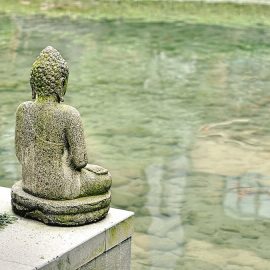
Is it possible to find genuine contentment in life? How can ancient wisdom guide us through modern challenges?
In Letters From a Stoic, Seneca presents timeless insights about living with purpose and maintaining inner peace. The Stoic philosophy of Seneca offers practical guidance on everything from handling adversity to finding fulfillment through simplicity and moral excellence.
Keep reading to discover how these ancient teachings can transform your approach to life’s biggest challenges.
The Stoic Philosophy of Seneca
The Stoic philosophy of Seneca is outlined in his book Letters From a Stoic. According to Seneca, Stoicism provides a compelling framework for understanding our place in the universe and the fundamental nature of our being. Through examining its core principles, we learn how to engage in public matters.
Stoicism teaches the acceptance of fate, viewing it as a manifestation of universal divine logic. (Shortform note: Some may argue that Stoicism’s acceptance of fate does not necessarily imply a divine logic but rather an acceptance of the natural order of things.)
The philosophy provides a framework for public life through logical reasoning and acceptance of the natural order of the universe. (Shortform note: The idea that Stoicism provides a clear framework for public engagement might be contested by those who see Stoicism as more focused on personal virtue than on civic duty.)
According to Stoic belief, the universe operates through divine logic, with all events unfolding according to a preordained design. True happiness comes from living in harmony with nature and allowing reason to guide one’s actions. The philosophy gained widespread acceptance in Rome because it offered a structured approach to managing civic duties, emphasizing logical thought, moral conduct, and acceptance of one’s place in the universe. Seneca portrays the universe as the ultimate work of art, highlighting its intrinsic balance and harmony as reflections of divine benevolence.
(Shortform note: Seneca’s adherence to Stoic ideals is debated due to his affluent lifestyle conflicting with Stoic principles that emphasize simplicity and detachment from material wealth. Critics question whether his actions aligned with the Stoic philosophy he preached, given his wealth and political connections. Seneca’s luxurious lifestyle seems contradictory to the Stoic belief that true happiness comes from virtue rather than material possessions. This discrepancy between his teachings and his personal life raises doubts about the extent of his commitment to Stoic principles.)
Moral Uprightness and Self-Control
Seneca’s works emphasize the Stoic commitment to moral uprightness and the pursuit of self-control and enlightenment. (Shortform note: Seneca’s emphasis on moral uprightness and self-control could be seen as idealistic and not fully attainable in the context of human complexity and imperfection.)
Seneca used Stoicism as a framework to guide and oversee Emperor Nero’s activities. (Shortform note: The advice Seneca gave to Emperor Nero could be critiqued for its effectiveness, given Nero’s eventual descent into tyranny.)
In his writings, Seneca emphasizes the importance of facing life’s challenges with calmness while cultivating moral excellence and insight. He argues that the pursuit of wisdom is essential for human contentment, maintaining that even basic understanding can make life more bearable. Seneca stresses the importance of daily dedication to self-improvement and introspection, highlighting how wisdom contributes to a fulfilling life. He advocates for clear, straightforward discourse, prioritizing Stoic principles of humility and self-control over ostentation.
Seneca holds philosophy in high regard, viewing its insights as essential not only for philosophers but as a fundamental support for society’s welfare. He emphasizes living modestly and rejects the pursuit of wealth, consistent with the Stoic principle that material wealth lacks inherent value. Stoicism teaches that true freedom and happiness come through cultivating virtue and wisely managing one’s life. In his role as Nero’s advisor, Seneca likely aimed to instill governance guided by prudence and moral integrity through Stoic principles.
(Shortform note: The Stoic principles encompass accepting fate, living in harmony with nature, and prioritizing virtue over material wealth. Stoicism emphasizes maintaining composure in the face of challenges, cultivating moral excellence, and seeking wisdom for a fulfilling life. Seneca’s teachings advocate for simplicity, fortitude in adversity, and the pursuit of ethical integrity in daily actions. The application of Stoic principles involves aligning one’s behavior with inner virtues, fostering tranquility amidst life’s uncertainties, and embodying moral principles in both words and deeds.)
Practical Guidance for Living
Seneca provides guidance on leading a life rooted in virtue. His exploration of Stoicism offers insights into living with ethical integrity, emphasizing the importance of a straightforward, resilient, and well-informed approach to life.
Simple Living and Material Wealth
Seneca advocates for a simple way of living that moves away from the pursuit of material wealth. (Shortform note: Advocating for a simple life over material wealth may not take into account the complexities of economic systems and the necessity of wealth for societal development.)
In championing a simple lifestyle, Seneca emphasizes developing psychological strength to handle hardship and scarcity. He warns against blindly following societal standards, noting that commonly accepted beliefs can be mistaken for truth. Rather than leaving virtue to chance, he stresses the importance of cultivating it deliberately. Seneca considers pleasure to be trivial, pointing out that even animals can experience it. The true path to virtue, he believes, lies in developing the mind and soul—qualities that are inherent and cannot be given or taken away. Philosophy, according to Seneca, requires consistent dedication rather than occasional attention amid distractions, and should serve as the foundation for our life choices and preferences.
Dealing With Adversity
Seneca presents strategies for building mental resilience to embrace, not just endure, scarcity and adversity. (Shortform note: The advice to fortify oneself against scarcity and adversity might be seen as insensitive to those who live in conditions where scarcity is not a choice but a harsh reality.)
He recommends occasionally choosing simple food and basic clothing to understand that losing material comforts doesn’t mean losing what truly matters. Seneca encourages finding happiness independent of wealth, suggesting that genuine fulfillment comes from simple pleasures that fortune cannot affect. By becoming familiar with a simpler lifestyle, people can develop peace of mind when facing potential financial difficulties and greater appreciation during times of abundance.
Approaching Pain and Mortality
Seneca promotes developing a balanced attitude when facing pain, illness, and death. (Shortform note: The advocacy for composure in the face of pain and mortality could be criticized for potentially dismissing the natural human emotions of grief and fear.)
Central to Seneca’s philosophy is maintaining calm during life’s challenges. He suggests that achieving peace of mind requires letting go of anxiety about potential future hardships, and views death as neither good nor bad. Seneca believes that intellectual pursuits provide more reliable satisfaction than physical pleasures, encouraging people to resist sensual temptations. During times of illness and difficulty, a virtuous person demonstrates how to overcome or endure challenges calmly, maintaining inner peace and serving as an example for others.
Learning From Exemplars
Seneca views figures like Socrates as models of Stoic virtues. (Shortform note: While Seneca admired Socrates as a Stoic exemplar, some might argue that Socrates himself was not a Stoic and that his philosophy had significant differences from Stoicism.)
Seneca frequently draws upon the wisdom of ancient philosophers. He particularly admires Socrates for maintaining unwavering serenity during tyranny, conflict, imprisonment, and even in his final moments. Socrates represents the ideal of Stoic virtue, demonstrating that living according to Stoic principles naturally leads to tranquility and steadfast determination. His ability to maintain inner peace despite external circumstances serves as a powerful example of Stoic principles in action.
| The Persistence of Stoic Practice What do J.K. Rowling, LL Cool J, and George Washington have in common? Stoic philosophy. For generations, Stoicism has motivated scores of people to live well. In The Daily Stoic, Ryan Holiday and translator Stephen Hanselman share insights from the ancient Stoic philosophers on how you, too, can live a good life. It was a bestseller in 2016 and has since been expanded into a thriving podcast and website. At the core of Stoicism is the belief that the cardinal virtues—self-control, courage, justice, and wisdom—are the source of internal stability and the measure of a good life. Our guide to The Daily Stoic explores three categories of Stoic practices the authors cover in the book, including viewing life with self-control, responding to life with justice and courage, and managing our lives with wisdom. Within each category, we look at essential principles that support these Stoic practices. Our commentary explores other perspectives on these principles and offers more insights from Stoic philosophy and modern psychology. |






